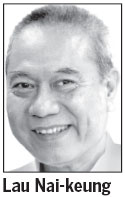Ethics a weapon for Leung
Updated: 2013-01-29 06:39
By Lau Nai-keung(HK Edition)
|
|||||||

During the time of Marx, Lenin and later, Mao, Communism was perceived as the antithesis of capitalism. Today, Communists in China have, in many ways, embraced market economy, and are competing in the world system under multilateral frameworks such as the United Nations and the World Trade Organization. The irony is China is now as threatening as the Pax Americana to the world order, if not more so. Instead of the expected "peaceful transformation" or the "great convergence," the US now finds its status as the world's largest economy in danger of being overtaken by China this decade. As its economic hegemony falls apart, the US is also losing its grip on the ideological front. There was a time when the "Washington consensus" was unchallenged by mainstream intellectuals. Now people are seriously considering the merits of China's development model - Chinese-style socialism, especially its implications for other developing countries.
This is where the concept of integrity comes into play. What some people want us to believe is that China has become filthy rich overnight, not because its people are enterprising and hardworking, but because they do not play by the rules.
The gist of all the attacks against CY Leung also follows along the same lines. It is alright to have illegal structures, as all our upper-middle class have some at home, but CY is doomed because he could not account for every single detail about the properties he owned during his lifetime.
I am not quite sure how exactly the argument goes. Sometimes it is "communists lie, CY is a communist and therefore CY lies." Other times, it is "CY lies. Only communists tell lies, therefore CY must be a communist." But how else can you explain the accusation that an illegal structure owner must somehow also undermine One Country Two Systems and our "core values".
This confused logic has given Lew Mon-hung an opportunity to link his personal interests with the city's favorite pastime - that of sporting CY's moral failures. When you think about it, even if CY did promise Lew things as the latter claims, not honoring them is definitely good for "One Country, Two Systems" and our "core values", and we should be glad.
People talk about protecting "One Country, Two Systems" all the time, but few knows what exactly the two systems are any more. There are vague notions about our system being infringed by the mainland system, but these claims do not make much sense. After the mainland embraced reform and opening up, the differences between the two systems are increasingly blurred, and merely administrative. The truth is, local sentiments want more protectionist measures to safeguard their vested interests. Our "system" has nothing to do with the capitalist system or spirit, as it now stands simply for "Hong Kong stuff for Hong Kongers" - the stuff ranges from milk powder to apartments.
The key to the problem is to realize that there are two distinctive kinds of vested interests in Hong Kong - that of the tycoons and the average citizen's parochial interests. Neither of them is justifiable, but they can only be tackled if considered together. They have contradictions, but at the moment, the dissidents have aligned them under one united front, subsuming their differences.
If we can make the tycoons give up some of their margins, our society and our people can become much more competitive vis-a-vis the mainland, and Hong Kongers would be able to feel much more secure and positive.
Ethics have always been the weapon of choice for conservatives, but CY should be telling them that ethics are multi-dimensional and multi-layered. In fact, CY can use the Lew incident to his advantage by showing people that no deals would be honored if that's not in the people's interests. Lew is not the first person saying that CY is mean, but this meanness is open to interpretation. Right now, we are still unable to decide, and the decisive factor would be CY's ability to implement real changes against tycoons' interests.
The author is a member of the Commission on Strategic Development.
(HK Edition 01/29/2013 page1)